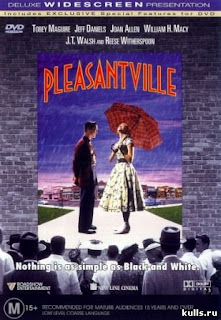It’s 1999 and David is a dedicated fan of the 1950s TV show, Pleasantville: a world where there is no conflict, no dangers, no divorce, and no sex. Envious of the simple life that these fictional characters lead, David never dreamed that he would actually wind up in Pleasantville. Incredibly, when they’re remote breaks and a TV repairman gives them a new one, both David and his sister Jennifer are transported into the world of Pleasantville. Forced to pretend to be TV siblings Bud and Mary Sue, David and Jennifer, using their modern habits and desires, are soon teaching the uptight townsfolk of Pleasantville how to express themselves and in the process they realise that life in Pleasantville is not as simple as black and white.
This film is a dream come true for any English student who loves interpreting the underlying meanings of the text. Pleasantville is thick with layers of meaning through colour, history, mythology, politics, and comedy. It’s a really quirky and interesting little film that is guaranteed to have you completely enthralled from start to finish. I LOVE THIS FILM and I find it personally upsetting that it does not make it into The Book.
It’s 1999 and David is a dedicated fan of the 1950s TV show, Pleasantville: a world where there is no conflict, no dangers, no divorce, and no sex. Envious of the simple life that these fictional characters lead, David never dreamed that he would actually wind up in Pleasantville. Incredibly, when they’re remote breaks and a TV repairman gives them a new one, both David and his sister Jennifer are transported into the world of Pleasantville. Forced to take on the persona of TV siblings Bud and Mary Sue, David and Jennifer, using their modern habits and desires, are soon teaching the uptight characters of Pleasantville how to express themselves and in the process, they realise that life in Pleasantville isn’t really as simple as black and white.
It would be horrible of me to use the metaphor and say that this movie is like an onion because it’s too delicious and sweet to be so. So I’m going to say that this movie is like a cake…maybe a black forest cake. There are so many delicious layers that make up this visually stunning and wonderfully decadent movie!
Obviously, the most powerful and dominant element in this film is its reliance on colour. As David and Jennifer begin to affect the characters of Pleasantville, each character goes from black and white into technicolour. And what I particularly love about the transformations is that they are slow and don’t happen all at once. An example is a black and white girl going to the doctor because her tongue has turned pink. Just her tongue. The way that colour subtly seeps into the movie really accentuates the changes and is actually rather striking. It’s absolutely beautiful.
As I mentioned before, this is an English student’s dream text because, not only is there so much room for interpretation of the text, you can look at the film from absolutely any angle. You can look at it in terms of politics: the characters living according to a strict code of behaviour, almost like a dictatorship or totalitarian society. You can look at it in terms of religion: what is new is met with fear and hatred, not to mention the obvious reference to the Adam and Eve story. You can even take a feministic point of view: women are there merely to cook and clean while the male is the primary breadwinner and master of the house. Seriously, you can look at it in any light and it will still be meaningful and present some strong messages.
Featuring wonderful performances from Toby Maguire, Jeff Daniels, Reese Witherspoon, William H. Macy, and J.T Walsh, Pleasantville is one of my all-time favourite movies. Filled with drama, colour, romance, comedy, sex, and armed with a very clever script, it’s a really, really beautiful film that will you have looking at it differently every time!

No comments:
Post a Comment